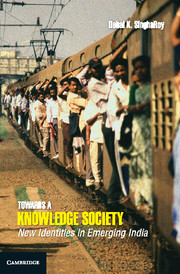Book contents
- Frontmatter
- Contents
- List of Tables and Figures
- Preface
- 1 Introduction: Conceptualising Knowledge Society: Critical Dimensions and Ideal Image
- 2 Critiquing and Contextualising Knowledge Society
- 3 Strategising for Knowledge Society in India: The Shifting Backdrops and Emerging Contexts
- 4 Education for Knowledge Society in India
- 5 Information and Communication Technologies for Knowledge Society
- 6 Indian Growth Story: Service and Knowledge Dynamics
- 7 Education, ICTs and Work: The Divergent Empirical Reality
- 8 Knowledge Society: Work, Workers and Work Relations
- 9 Knowledge Society: Culture, Continuity and Contradictions
- 10 Conclusion: Marginality, Identity, Fluidity and Beyond
- Bibliography
- Index
5 - Information and Communication Technologies for Knowledge Society
Published online by Cambridge University Press: 05 August 2014
- Frontmatter
- Contents
- List of Tables and Figures
- Preface
- 1 Introduction: Conceptualising Knowledge Society: Critical Dimensions and Ideal Image
- 2 Critiquing and Contextualising Knowledge Society
- 3 Strategising for Knowledge Society in India: The Shifting Backdrops and Emerging Contexts
- 4 Education for Knowledge Society in India
- 5 Information and Communication Technologies for Knowledge Society
- 6 Indian Growth Story: Service and Knowledge Dynamics
- 7 Education, ICTs and Work: The Divergent Empirical Reality
- 8 Knowledge Society: Work, Workers and Work Relations
- 9 Knowledge Society: Culture, Continuity and Contradictions
- 10 Conclusion: Marginality, Identity, Fluidity and Beyond
- Bibliography
- Index
Summary
ICTs: The Ever Greatest Mobiliser
Notwithstanding the debate as to whether technology shapes social progression or vice versa, it is widely acknowledged that technology has always remained a crucial component of development all through the progression of human society. Importantly, each stage of society is marked by the significance of specific type of technology, as plough was for the agrarian and steam engine for industrial, in recent decades Information and Communication Technologies (ICTs) have been for the knowledge society. Each of these technologies again functions in specific socioeconomic and political contexts as the agrarian technologies work in localised rural contexts, industrial technologies in the urban and national contexts, while ICTs in the global contexts cutting across the boundaries of geographical contextualisation, as knowledge does.
ICTs as the prime constituents of knowledge society along with globalisation have paved the way for the emergence of new waves of economy, culture and politics across the world. These waves are widely globalised and have brought into being phenomenal time-space compression in all areas of human activities, and have injected considerable new orientation, on the one hand, and disorientations in the preexisting institutional arrangements, values and norms, social interaction and behavioural and cultural practises, on the other. Though ICT, like any other technology, is a product of human brain, it works in association with human brain to generate power, knowledge, wealth, connectivity and new social and cultural dynamics.
- Type
- Chapter
- Information
- Towards a Knowledge SocietyNew Identities in Emerging India, pp. 137 - 163Publisher: Cambridge University PressPrint publication year: 2014



